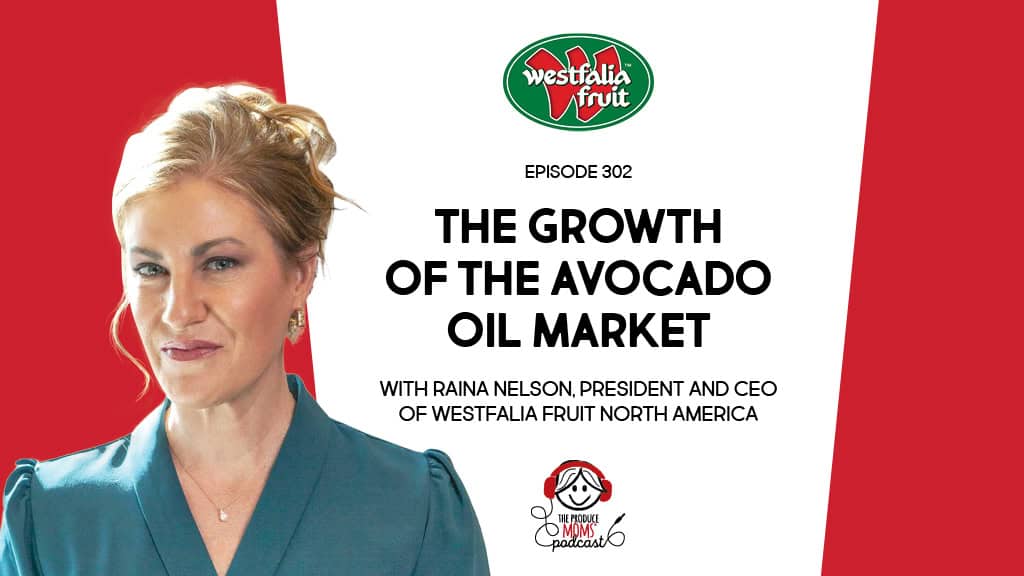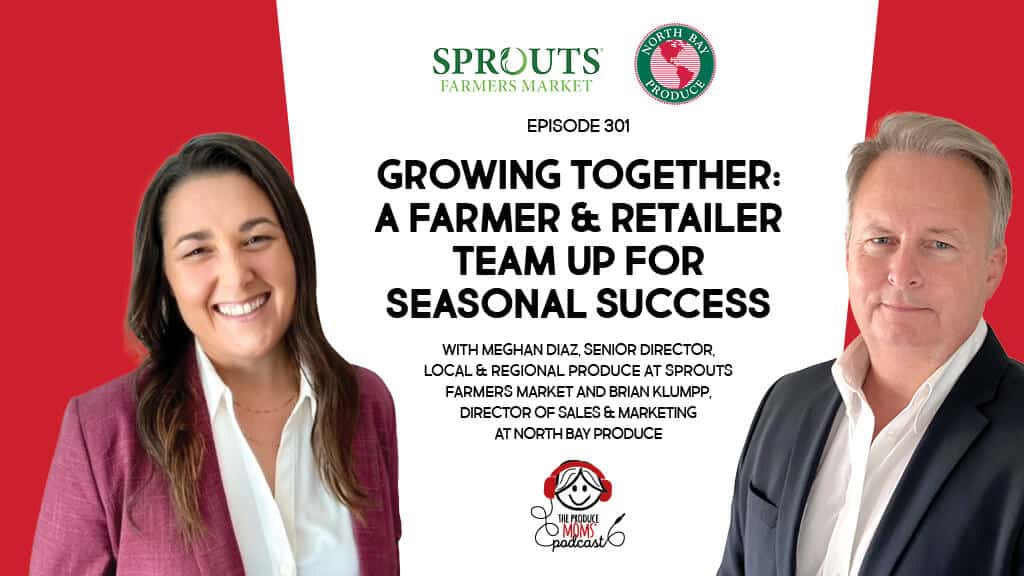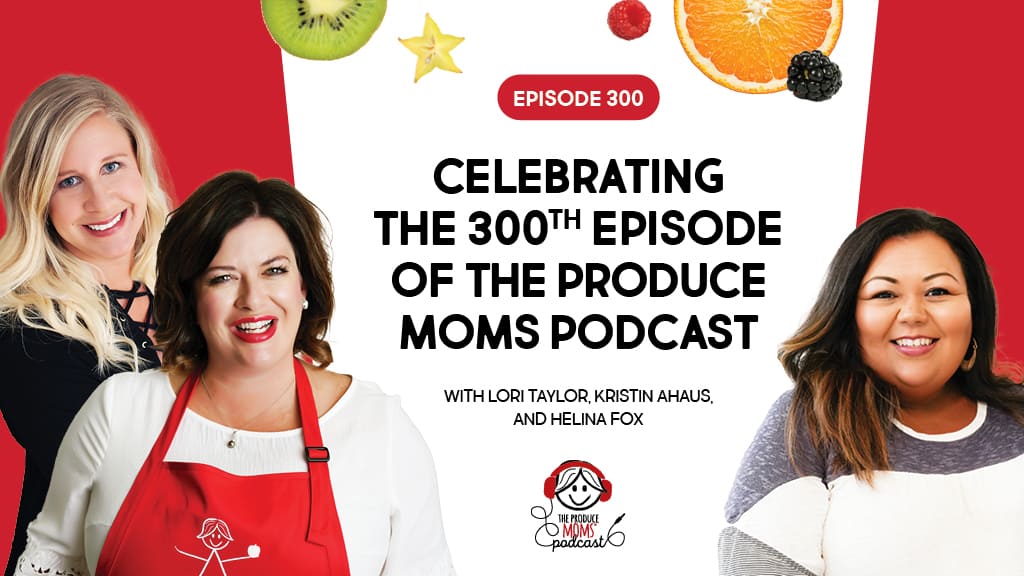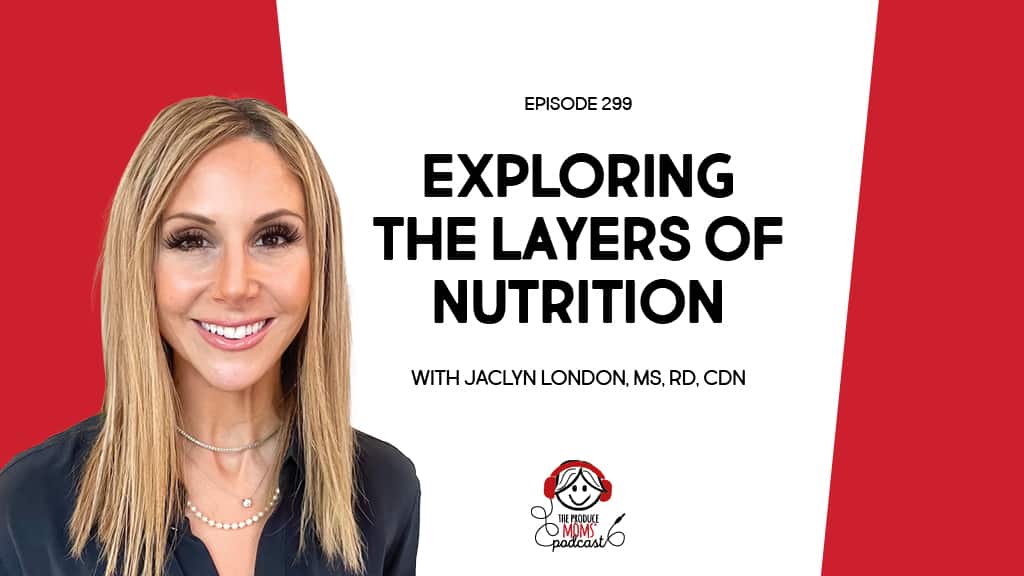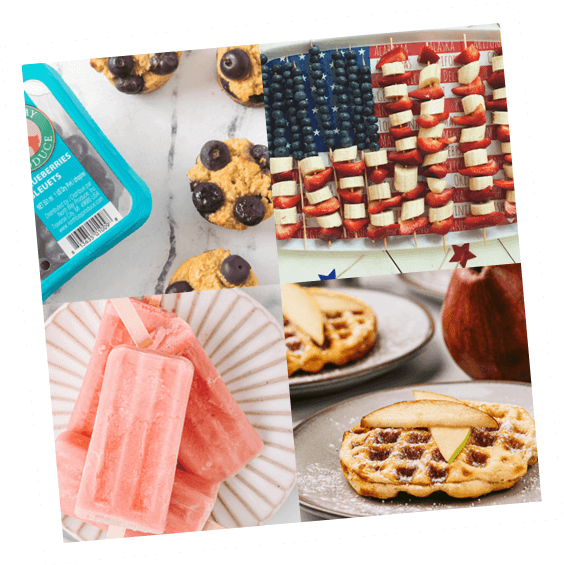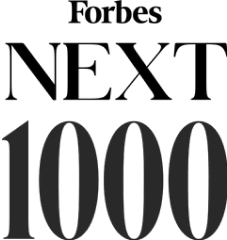Episode 263: Food as Medicine Series with Holly Freishtat
Jun 21, 2023
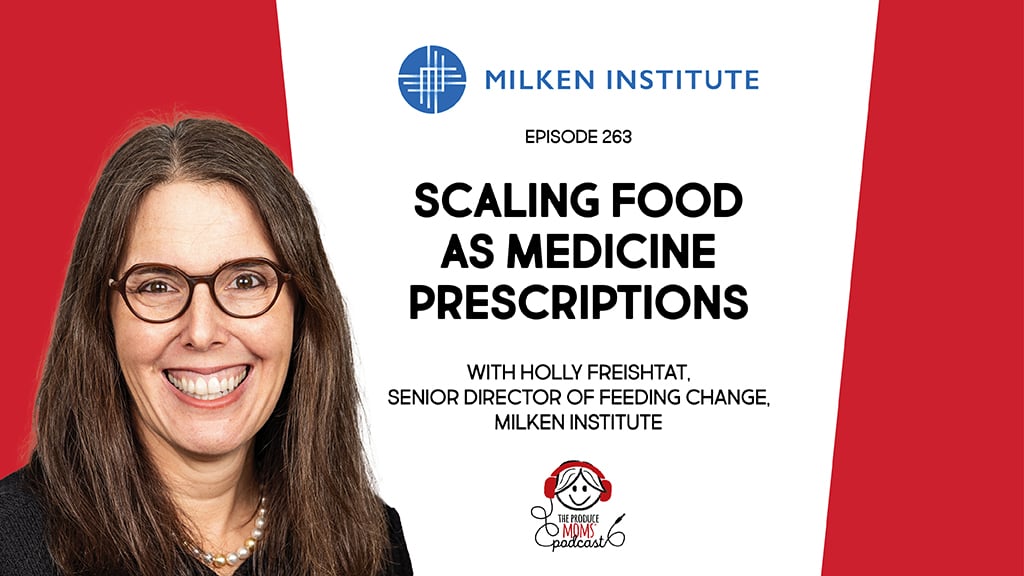
This post may contain affiliate links. Please read our disclosure policy.
Access to nutritious food is a fundamental aspect of public health, yet millions of people around the world struggle with food insecurity and its detrimental consequences on their well-being. Milken Institute has been working to address this challenge. On today’s episode, we will speak with Holly Freishtat, Senior Director of Feeding Change at Milken Institute about their efforts and the market solutions they employ to scale up the implementation of Food is Medicine prescriptions, bridging the gap between health and nutrition.
For more information visit: Financial Innovations Lab: Market Solutions for Scaling Food Is Medicine Prescriptions (milkeninstitute.org)
Episode Transcript:
Lori Taylor (00:01.45)
Hello everybody. This is the produce moms podcast. We are so excited to be coming at you today with another wonderful episode within our food is medicine mini series. So today we are back. Thank you to crunch pack, who is the sponsor of this entire mini series. Tony fry tag is here helping me with the cohosting and we have the most amazing guest ever as part of this esteemed lineup. So we are so excited.
Lori Taylor (00:29.73)
to welcome from the Milken Institute, Holly Freistadt. She is the Senior Director of Feeding Change for the Milken Institute. Oh my goodness, this woman is absolutely moving and shaking as it relates to food as medicine. So Holly, welcome to the show. We’re glad you’re here.
Holly Freishtat (00:46.8)
Great, thank you so much, Laura and Tony. Great to be here today.
Lori Taylor (00:51.106)
Thank you for being here. All right, so we’re gonna get things kicked off, Holly, and we need to define to folks who are unfamiliar with the Milken Institute, let’s help set the tone. What is it, who do you serve, what problems are you solving in the world at the Milken Institute? So, let’s get started.
Holly Freishtat (01:10.468)
Great, so I’ll start with the Milken Institute. We’re a nonprofit, nonpartisan think tank. And we sit at the intersection of finance and health. And we’re accelerating measurable progress on a path to a meaningful life. So what does that really mean? We are a think tank that we’re doing research, thought leadership, policy to make change in this world. So I would say we’re looking at how to really make meaningful impact and change from a personal level.
Holly Freishtat (01:40.176)
a system, a policy, and an international and world perspective. And so when we look at feeding change and how we fit into the milk and institutes, we sit within the world of health, right? And so health and food systems go hand in hand. And so feeding change, we’re creating a more resilient, sustainable, nutritious, equitable food system. And so when I use the terminology of food system,
Lori Taylor (01:46.53)
Fantastic.
Holly Freishtat (02:08.064)
And Lori, I know that you might have some great ideas of how we should think through this. It’s how we grow, process, transport, consume waste food, right? And it’s also who’s being impacted along the way. And so-
Lori Taylor (02:12.054)
Hahaha!
Lori Taylor (02:19.266)
That’s right.
Lori Taylor (02:23.35)
Mm-hmm. Yeah, you’re right, Holly. We call that at TPM. Our terminology for that is seed to smile. We actually have named our newsletter Seed to Smile because we do feel like we cover, we try to be a catalyst and have that ambassadorship for everyone within the food supply system, the food system, the food supply chain, the food value chain. We’ve used all those terms, but yeah. Seed to smile is what we call it.
Holly Freishtat (02:52.252)
When we look at this food system and the work of feeding change, we look at it from a nutritious food system, and that’s some of the work that we’re going to be discussing in depth today around food as medicine and also nutrition security. When we look at a resilient, sustainable food system, we’re looking at how adaptable, reactive, responsive it can be. And we saw lessons learned from COVID-19, its need related to supply chain and everyone along the food system. How do we create a more resilient, sustainable food system?
Holly Freishtat (03:22.104)
And then when we look at an equitable food system, understanding that needs to be embedded into everything we do related to the food system. Who is included in the conversations, how decisions are made, how these policies will impact people across the entire economic landscape, also the entire food system.
Lori Taylor (03:43.35)
That’s fantastic and thank you very much for just defining that. Another thing I wanted to ask you about, nutrition security versus food security. Is that, I’m assuming that’s a deliberate terminology choice of words and vernacular there.
Holly Freishtat (04:02.544)
that is definitely deliberate. So when we look at explaining what nutrition security means, it means really looking at the foods that people need for a nutritious, healthy diet. So when you think about hunger and food insecurity, right, or food insecurity, it’s making sure that to address food insecurity, you provide food security, right? So that could be any foods, enough food to be able to have the calories.
Holly Freishtat (04:26.236)
and the food to be able to sustain yourself. It doesn’t mean you’ll be healthy. It doesn’t mean it’s nutritious. It just means that you’re not skipping meals and that you’re not hungry. When we look at nutrition security, we’re looking at making sure the foods that are available and accessible and affordable can provide a healthy lifestyle. So that’s looking at nutrition security, you’re looking at fruits and vegetables and how to make sure that those are available and accessible and affordable. And so…
Holly Freishtat (04:56.024)
One of the important parts of looking at nutrition security, right, there’s this exchange between nutrition security and food as medicine, right? So nutrition security is really looking at the access issue. Do you have the availability of these foods for yourself, for your family, to be able to have a nutritious, healthy diet? When we look at food prescriptions and food as medicine, the work that we’re going to be talking about today, we’re really looking at this understanding of
Holly Freishtat (05:26.384)
How can food be part of the treatment? It’s not just about making sure the food is available to you. And I’ll tell a quick story to start this off. So previous to this job, around a year and a half ago, I took this job at the Milken Institute. But before that, I worked for the city of Baltimore as the chief of food policy and planning. And I was there for 11 plus years and worked on all food system-related issues. But most recently, it was the COVID-19 nutrition security response.
Lori Taylor (05:33.514)
Right? Right?
Holly Freishtat (05:57.244)
And during that response, due to FEMA funding, we were really be able to do a very large, scalable response on fruit and vegetable boxes, being delivered 18,000 boxes a week at over 90 sites for two consecutive years. And we were able to really see a lasting, significant change here during those years with increased fruit and vegetable consumption. But here’s a story I wanna mention. So we were able to provide access.
Holly Freishtat (06:26.116)
to fresh purchase fruits and vegetables once a week for two years. And there’s this woman who came up to me, she said, thank you so much, you know, for these produce boxes. I’ve been able, I’ve been using them every week and it’s been really great. You know, I’ve been really enjoying these bananas and it’s been great and I’m a diabetic. And that was this moment in time, it’s not necessarily about education. Yes, we need education.
Lori Taylor (06:33.078)
Wow.
Lori Taylor (06:48.196)
Mm.
Holly Freishtat (06:53.656)
But food needs to be tied into healthcare, right? Food so that if you’re a diabetic and you go to your doctor’s office or you go to healthcare and they say, are you food and ask you questions like, do you miss meals, food insecurity related questions and find out that you are food insecure, right? And you have diabetes, they would say, well, just imagine that you could have that tied to your treatment plan, that you would be able to get not just produce, but the right food for your condition.
Lori Taylor (06:57.346)
Right?
Holly Freishtat (07:23.384)
That could be a reimbursable expense.
Lori Taylor (07:23.422)
Right. Amazing. And you might not realize this, Holly, we did have Mark Walker from Performance Nutrition on and we talked all about medically tailored meals. So we have a whole standalone episode within this series on medically tailored meals, which is, folks, that’s exactly what Holly’s describing right now. I love it. So I’m gonna pass the mic to Tony, but before I do, Holly, just…
Lori Taylor (07:51.166)
You know, this is the Produce Moms podcast. So scale of one to 10, how important are fruits and vegetables in the work that you’re doing right now? There we go. All right. I’d love to hear it. Okay, Tony, the mic is yours. I know you’ve got questions to ask of Holly. So Holly, thank you for kicking off the show with just so much passion and helping us set the tone for what’s gonna be a great discussion today.
Tony Freytag (08:17.815)
Holly, thanks so much for being on. And it was such a pleasure to meet you in Chicago and serving on the panel with some great, great folks. I mean, it was two days sort of drinking from the firehose and hoping I didn’t drown. As a company, a food producer, we’re virtually vertical. So we go from the orchard
Tony Freytag (08:47.447)
with some of our partners to the kitchen table. I mean, we cover everything. And so it’s exciting to hear what is going on having lived through in more ways than one, COVID and what all went on. And when you talk about transportation and when you talk about what was available, what was not available, what was essential, what was not essential.
Tony Freytag (09:16.087)
It was sort of mind-boggling and and somehow we did it We all did it just like what you were saying about what was going on in Baltimore and half off to that But tell us more as far as as far as the Milken Institute in your role You know you talk about a task force you talked about your members I mean food and then there’s the food is medicine pyramid And so please share with us
Tony Freytag (09:44.611)
I mean, that’s probably the whole show right there, so we can drop the rest of it. But we’ll start off there and let you run with it.
Lori Taylor (13:06.062)
Sure.
Lori Taylor (13:22.283)
Right.
Lori Taylor (13:29.24)
Right.
Lori Taylor (13:37.502)
Right. I love that. And you’re describing, as you take that agnostic approach, that is all part of your previous remarks with that’s part of the food system. All of those stakeholders are. So yeah, very good.
Tony Freytag (13:39.399)
That’s it.
Tony Freytag (13:54.263)
And it’s fascinating simply because there’s so many integrated parts. And I’m like you, I’ve sort of bounced back and forth between food as medicine, food is medicine because they’re so integrated. But in essence, that’s true. They’re both. And so we’re so excited as a company that does fruits and vegetables.
Tony Freytag (14:21.879)
you know, we’re serving that need and working with the retailers all over the country to make sure that it’s available. And so I’ll tell you from my standpoint and Crunchback’s standpoint, we very much appreciate these efforts and the efforts that you’re doing. So thank you, thank you, thank you, because it’s heightening awareness of I think what we’ve all inherently known. But now there’s such a force behind it.
Tony Freytag (14:49.847)
And that’s what’s so exciting that I’ve seen just in this last year or so, just to take on. And I know, you know, Laurie, you and I have talked and said, oh, well, this has been going on for some time. Yes, it has. But in the last year, it’s been an explosion of efforts on so many fronts. And that’s so exciting. So thank you again for all the hard work that you’re doing and the
Tony Freytag (15:17.615)
to keep everything flowing because that’s what’s so necessary. Again, logistics, transportation, everything. So it’s just great that you’re willing to share with us all these wonderful things that the Milken Institute is doing.
Lori Taylor (15:31.798)
I agree, Toni. And Holly, I’d love to kind of piggyback that. And you know what, Toni and I both, when we left the Food is Medicine summit, we’ve talked extensively at how this is, there’s a, you know, like obvious level of momentum here with the Food is Medicine movement. When did, when do you believe this movement began? And you know, what do you think is the catalyst for this sudden momentum?
Lori Taylor (16:00.82)
Mm-hmm.
Lori Taylor (16:15.329)
Yeah.
Lori Taylor (16:31.81)
Yep.
Lori Taylor (16:46.667)
Yeah.
Lori Taylor (16:49.637)
Mm-hmm.
Lori Taylor (16:58.14)
Right.
Lori Taylor (17:17.794)
Okay.
Lori Taylor (17:31.395)
Sure.
Lori Taylor (17:39.882)
Yes, we want you to. In this deliberate focus, that is why the Milken Institute comes forward with food is medicine as your primary terminology. Okay. Okay, well, let’s dive into the research. Tell us more about it. So, I’m gonna go ahead and start with the research.
Tony Freytag (17:40.719)
Absolutely. Please.
Lori Taylor (20:29.13)
Right.
Lori Taylor (20:41.706)
Mm-hmm.
Lori Taylor (20:47.466)
Right.
Lori Taylor (21:44.51)
Yeah, no, I’m gonna clap just for post marking this. Holly, I mean, this is amazing. So my primary question for you as it relates to this is just, so, you know, I mean, it’s like, you have to have research and data to really do anything as it relates to public sector and certainly any public-private partnerships, but how is this research a game changer?
Lori Taylor (22:13.138)
for the food is medicine movement, or the food is medicine concept, the food is medicine movement, and the food is, what did you say the new term is, that you’re adopt, food, yes, yes. So help us understand, like, okay, we’ve got this incredible research. How is it going to be a tool to drive us even more forward? How is it going to take things to higher levels?
Tony Freytag (22:24.677)
prescriptions.
Lori Taylor (24:10.954)
Yeah.
Lori Taylor (24:18.254)
Sure.
Lori Taylor (25:20.097)
Right.
Lori Taylor (25:35.842)
Sure. Yeah, and I think honestly that was my biggest takeaway from the recent summit where we all met. I could not believe the volume of stakeholders and the intercession of so many different industries because food systems really has never had, in my opinion, I mean, I’ve been in the produce industry and the food supply chain industry for.
Lori Taylor (26:02.478)
20 years now, Holly, and I’ve never seen this kind of cross-OPCO collaboration with other giant industries like healthcare and finance and so on and so forth.
Lori Taylor (27:10.272)
Yeah.
Lori Taylor (27:27.456)
Mm-hmm.
Lori Taylor (27:56.22)
Right.
Lori Taylor (28:39.872)
Yeah.
Lori Taylor (28:57.611)
Right.
Lori Taylor (29:06.994)
Yeah, I love that. Well, one second. All right, so we are at the scheduled time. Are you guys both good if we take maybe another five to 10 minutes to wrap things up properly? Okay, great. Okay, so Tony, I’ll let you kind of carry on with the follow-up remarks here to what Holly’s saying. I’m gonna clap in the mic for editorial purposes.
Tony Freytag (29:18.682)
Absolutely.
Tony Freytag (29:41.023)
It is fascinating what you’re talking about. And it’s getting all those pieces to come together in that puzzle. And I can, and you’re right, we’re used to take this antibiotic for two weeks or take this. But then there are things like statins that you’re gonna take for the rest of your life, myself included. So what are the grassroots? What can we do?
Tony Freytag (30:09.871)
What can we do at the grassroots level? Because Lori and I are both involved with International Fresh Produce Association. And so we’re both involved with the grassroots. And how do we get our members across the country, across the world excited about this? Or what can we do? That’s the question.
Lori Taylor (30:30.442)
Well, and to take it a step further, Tony, even the household level, Holly, I mean, we have a massive consumer following. How do we, how do we make sure and mobilize all this great work, the thought leadership that’s coming out of your think tank and everything you’re doing as a senior director of feeding change at the Milken Institute, how do we make sure that, you know, people are requesting these food prescriptions at the same level, they’re requesting all the prescriptions that are coming at them during prime time television advertising, you know,
Lori Taylor (31:02.075)
Yes
Lori Taylor (31:14.84)
right.
Lori Taylor (31:18.786)
Yeah.
Lori Taylor (32:06.314)
gosh. Yes.
Lori Taylor (32:10.591)
Yes.
Lori Taylor (32:20.202)
That’s all right. Here we go.
Lori Taylor (32:38.094)
Wow.
Tony Freytag (32:53.071)
That’s just amazing. And to know that it’s just the beginning. One thing that I do want to mention is that somebody that goes to the Hill, just like you do, we go to Washington, DC. And I have found that this concept or this conversation has somewhat changed.
Lori Taylor (32:53.314)
Good.
Tony Freytag (33:14.499)
We as manufacturers, we as growers go to the Hill and talk about labor. We talk about immigration We talk about all those things that that generally have been talked about But when we start talking about this individually with members of Congress and members of the Senate their eyes light up There there is an open and and it doesn’t matter which side of the aisle that they’re on So when you talk about bipartisan, this is something that everybody everybody is going like
Tony Freytag (33:43.543)
Well, yeah, this is great. And it has changed the conversation. And so all of your hard work, the Millkin Institute, the work you did in Baltimore for 12 years, it’s like all coming together, but we can’t stop. We have to keep going. And thank you so, so much for being part of this because Lori’s followers and all of our followers are gonna learn more.
Tony Freytag (34:13.595)
So thank you, thank you for being part of this with us.
Lori Taylor (34:18.126)
We are, we’re so excited about it. You know, Holly, this has just been an incredible addition to the conversation here. As a matter of fact, when Tony and I were putting together this series, it was, you know, I don’t know if the show can go on without Holly. That’s how much we respected your role at the summit. And, you know, just the great work that’s happening at the Milken Institute in terms of this, you know, food systems, health, finance, the,
Lori Taylor (34:46.902)
the think tank, the new research, all of it. So everything you’re doing as a senior director of feeding change really matters, changing the world. One of my favorite things on your whole website in addition to this new report that you recently published is that Food is Medicine Intervention Pyramid. I think it really helps visualize what the grander objective is here.
Lori Taylor (35:14.25)
and how the process works in a nice visual that everyone can understand. So we’ll make sure and include that or link to it in the blog that we wrote, the show notes that correspond with this episode. But with that, yeah.
Lori Taylor (35:31.064)
Good.
Lori Taylor (35:41.41)
Fantastic, good. Well, with that, Holly, Tony, this has been a great show. You know, the hard work is just beginning. The change is just, the ball’s just getting rolling here, you know, and there is so much momentum. There’s a lot of passionate people behind this movement, folks. And Holly is among the best. So, Holly, thanks so much for being part of this special mini-series we’re doing and being our guest today on the show.
Tony Freytag (35:47.559)
Thank you both.
Tony Freytag (36:09.337)
Thank you.
Lori Taylor (36:11.998)
Yes. All right. Well, with that, folks stay with us. We are going to be coming at you next week with another episode here on the produce mom’s podcast, all about food is medicine, celebrating this amazing movement. Uh, food is medicine today though, as we, uh, as we say thank you to Holly and everyone at the milk and Institute and honor their incredible role and, and being the, you know, feed and feeding change, right? Like this is just, this is very exciting. So.
Tony Freytag (36:28.091)
Hehehe
Lori Taylor (36:41.91)
Thank you very much, Holly. We look forward to staying in touch with you. And as you know, you are welcome back at the Produce Moms podcast at any time. You are a superstar. Thank you.
